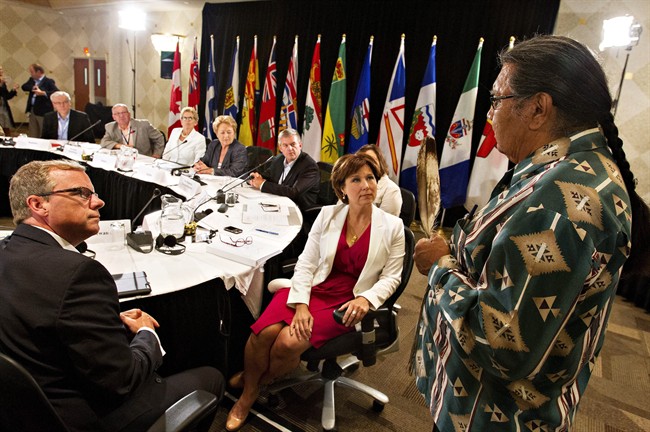TORONTO – As Canada’s provincial and territorial leaders hunker down Thursday in the historic Ontario town of Niagara-on-the-Lake, for some the idyllic setting will be a jarring contrast to the disaster-ravaged communities they’ve left behind.

Still weighed down by the unprecedented flooding in Alberta and the decimation of Lac-Megantic in Quebec, several premiers will be enlisting the help of their colleagues to prevent the kind of destruction they witnessed just a few weeks ago.
Ottawa already has a fund for disaster relief. But for some provincial leaders, responding to a disaster isn’t good enough.
“We actually have to put in place infrastructure and mitigation which should be funded by the federal government — as it has been up until now on an ad hoc basis — to make sure we’re preventing these disasters where possible,” Alberta Premier Alison Redford said in an interview.
Investing in more resilient infrastructure means people may not have to be evacuated when disaster strikes, said Manitoba Premier Greg Selinger, whose province was hammered by two storms last month that flooded several rural communities.
“Floods, serious weather events, fires, tornadoes — the list seems to be growing with the frequency and intensity of these events,” he said.
“We’re starting to recognize that we all have to be proactive and investing in dikes, like channels, fire protection — all of these kinds of investment will prevent serious loss of a normal lifestyle and economic losses in our communities.”
It’s more important now, given the extreme weather and “climate change realities” the country is facing, said Ontario Premier Kathleen Wynne. Toronto was hit by a flash flood a few weeks ago that crippled Canada’s most populous city.

Get breaking National news
“It’s about ports, it’s about roads, it’s about bridges,” said Wynne, who is chairing the Council of the Federation meeting. “There’s infrastructure across the country that we need to make sure is in good shape and that we need to enhance, given the current realities.”
Some of the talk at the summit will also centre on programs aimed at giving workers the training they need to find jobs — an issue that has the provinces and territories butting heads with Ottawa.
The federal Conservatives plan to change the way they contribute to training programs across Canada, by diverting some of the money they give the provinces to the Canada Job Grant, with the provinces and employers each kicking in a third. Negotiations with provinces and territories are supposed to happen over the summer and fall.
But provinces are complaining that they won’t have the flexibility to direct the money where it’s needed most. Wynne wants to negotiate the terms of the arrangement, while others want to be able to opt out with full compensation.
“All provincial premiers are interested in making sure we’re training people up to grow the economy nationally,” said B.C. Premier Christy Clark.
“We cannot do our bit in growing the national economy if the federal government isn’t contributing to skills training in the best way possible.”
The premiers may be in store for a more explosive exchange over energy transmission, as tensions between Quebec and Newfoundland and Labrador over the $7.7-billion Muskrat Falls hydro project reach a fever pitch.
Newfoundland Premier Kathy Dunderdale said she has no plans to directly confront Pauline Marois, her Quebec counterpart, but she’s no “shrinking violet” either.
“I’m certainly not going to shrink away from any kind of a challenge from Quebec or anyone else that states a position that’s not in the best interests of Newfoundland and Labrador,” she said.
“These occasions arise from time to time, and if they arise at this meeting, I’m certainly going to deal with it.”
Whether it’s hydro lines or oil and gas pipelines, energy transmission is important to all the provinces, she said. Newfoundland has the answer to Ontario’s energy needs, but they need a pathway to the province.
Talks about a possible west-east pipeline to transport Alberta oil to foreign markets is also expected to be a hot topic. In the wake of the fatal Lac-Megantic derailment disaster, the Council of Canadians is calling on Ottawa to tighten the rules and launch an independent safety review of all forms of transportation, including pipelines. The group hopes the premiers will back them up.
Redford dismissed the call as unnecessary.
“We have independent regulatory processes in our provinces to deal with these issues already, and it’s important to respect the independence of those institutions that are regulated by experts and people that understand the issues and take their advice,” she said.
“These are all processes that are already in place — that’s why they’re there. And to start layering more and more issues on this just makes it political and frankly, Canada can’t afford that.”
— with files from Chinta Puxley in Winnipeg, Dirk Meissner in Victoria, B.C. and Sue Bailey in St. John’s, Nfld.







Comments